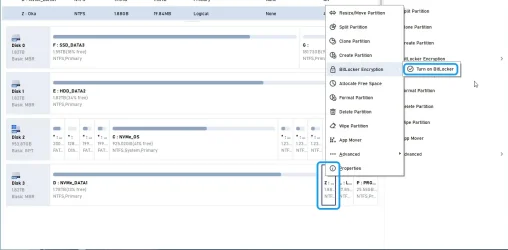- Local time
- 6:15 PM
- Posts
- 85
- OS
- Microsoft Windows 11 Pro 64-bit 22631 Multiprocessor Free
I am consciously needing to lock ( Encrypt ) a partition. I created a small partition to play encryption with.
My goal is to encrypt just that partition ( Z:\ ). I am confused in what comes up.
Explanation please !!!
Cheers
My goal is to encrypt just that partition ( Z:\ ). I am confused in what comes up.
Explanation please !!!
Cheers
- Windows Build/Version
- Windows 11 Pro 64Bit / 24H2 (26100.2454)
Attachments
My Computers
System One System Two
-
- OS
- Microsoft Windows 11 Pro 64-bit 22631 Multiprocessor Free
- Computer type
- PC/Desktop
- Manufacturer/Model
- Dell. Precision Tower 5810
- CPU
- Intel(R) Xeon(R) CPU E5-1607 v3 @ 3.10GHz
- Motherboard
- Dell Inc. Base Board. 0K240Y
- Memory
- Total: 16.00 GB Usable: 15.92 GB
- Graphics Card(s)
- NVIDIA Quadro K2200. Quadro K2200.
- Sound Card
- Sound Blaster Audigy Fx. NVIDIA High Definition Audio - Integrated
- Monitor(s) Displays
- Dell Monitors SE2417HG
- Screen Resolution
- 1920 x 1080
- Hard Drives
- 1TB ATA CT1000BX500SSD1 SCSI Disk Device
2TB ATA ST2000DM008-2FR1 SCSI Disk Device
2TB ATA ST31500341AS SCSI Disk Device
- Keyboard
- Dell Keyboard
- Mouse
- Vertical Wireless Mouse - 2.4GHz Optical Vertical Mice : 3 Adjustable DPI 800/1200/1600 Levels
- Internet Speed
- 945 Mbs (Down) 32 Mbs (Up)
- Browser
- Google Chrome. Firefox. Opera.
- Antivirus
- Windows Defender
- Other Info
- TP-Link Gigabit PCI Express Adapter (Ethernet 802.3)
Sophos TAP Adapter Provider (Ethernet 802.3)
-
- Operating System
- Microsoft Windows 11 Home 64-bit. 22631 Multiprocessor Free
- Computer type
- Laptop
- Manufacturer/Model
- Dell Inspiron 15-3530
- CPU
- 13th Gen Intel(R) Core(TM) i7-1355U
- Motherboard
- Dell Inc. 0122F5
- Memory
- Total Memory: 16.00 GB Usable Memory: 15.69 GB
- Graphics card(s)
- Intel(R) Iris(R) Xe Graphics
- Sound Card
- (1) Intel® Smart Sound Technology for Bluetooth® Audio (2) Intel® Smart Sound Technology for USB Audio (3) Realtek Audio
- Monitor(s) Displays
- Integrated
- Screen Resolution
- 1920 x 1080
- Hard Drives
- NVMe PC SN740 NVMe WD 512GB
- PSU
- Integrated
- Keyboard
- Integrated
- Mouse
- Integrated
- Internet Speed
- 143 Mbs Down / 43 Mbs Up
- Browser
- Google Chrome . Firefox
- Antivirus
- Windows Defender








